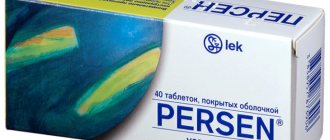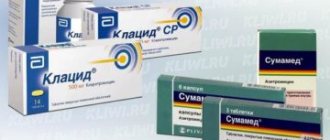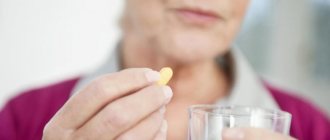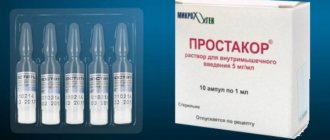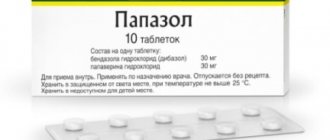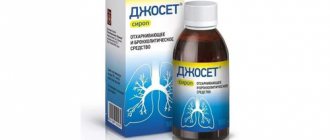pharmachologic effect
The active ingredient of this drug is sodium rabeprazole. Immediately after absorption of the drug in the gastric cavity, the process of blocking the enzyme begins, which ensures the secretion of hydrogen protons from the cells. This disrupts the formation of hydrochloric acid.
The effect of this drug begins 60 minutes after administration. And in the next 48 hours, the stomach is guaranteed to be protected from the negative effects of excessive release of hydrochloric acid.
This drug gives the maximum therapeutic effect within 4 hours after taking a single dosage. After discontinuation of the drug, the secretion process is restored to its previous level during the first (after discontinuation) two to three days.
In addition, the active ingredient Pariet has a detrimental effect on the bacterium that causes an inflammatory process on the mucous membrane of the stomach wall - Helicobacter pylori.
This drug does not affect the metabolic process, the functioning of the body’s cardiovascular system, central nervous system, excretory system, and does not cause pathological changes or negative reactions from the respiratory system. That is, in general, Pariet is considered a fairly safe therapeutic drug.
Composition and beneficial properties
In addition to the main active ingredient (rabeprazole), the tablet contains a number of excipients - this is a group of 13 components (mannitol, wax, magnesium oxide and stearate, talc, cellulose and others).
Due to blocking of the proton pump, Pariet, as a component of complex therapy, leads to the following:
- significant reduction in hyperacidity for 48 hours,
- protection of the mucous membranes of the stomach and duodenal bulb from the traumatic effects of aggressive hydrochloric acid and pancreatic enzymes,
- rapid healing of defects in the wall of the stomach and duodenal bulb or erosions of the mucous membrane,
- elimination of dyspepsia in the form of pain, heartburn, belching, nausea, diarrhea, flatulence.
The listed physiological and clinical effects develop approximately 40 minutes after taking the tablet. Stable subjective improvement occurs after 23 hours and lasts for two days. After stopping therapy with Pariet, the natural production of hydrochloric acid resumes after a few days.
Unlike earlier generations of drugs from the PPI group, Pariet does not cause negative effects on other systems and organs.
Is Pariet an antibiotic?
Pariet is an antisecretory and antiulcer agent. Belongs to the group of PPIs and has a mechanism of action characteristic of drugs in this series:
- inactivates the enzyme (H+/K+-ATPase),
- blocks the release of hydrochloric acid into the stomach.
The drug, regardless of the irritant, has a depressing effect on all types of gastric secretion (basal and stimulated). Pariet is not an antibiotic, but is used to eradicate H. Pylori as a component of anti-Helicobacter therapy. This is due to its own bactericidal effect. Rabeprazole is included in the regimen along with two other groups of drugs:
- antibacterial (Amoxicillin, Doxycycline, Clarithromycin),
- antimicrobial (Metronidazole).
This appointment is made in the presence of ulcer with verified H. Pylori. A preliminary study is carried out to confirm the presence of the bacterium: urease, breath or stool test.
The action of Pariet is based on the inhibition of HP activity due to inhibition of urease and ATPases of the microbial cell.
Currently, different generations of PPIs are used:
- I - omeprazole, lansoprazole (Omez, Lanzap),
- II - pantaprazole (Contraloc),
- III - rabeprazole (Pariet),
- IV - esomeprazole (Nexium).
Pariet is a drug of the third generation of proton pump inhibitors, it belongs to the means of basic therapy.
Release form and composition of the drug
Pariet is produced in the form of tablets containing 10 or 20 mg of active ingredient. Tablets of a smaller volume (10 mg) are pink, while tablets of a larger volume (20 mg) are yellow. Pariet tablets are packaged in pharmacological blisters of 14 pcs. each, and two blisters in one cardboard package.
As auxiliary components, each Pariet tablet contains substances such as: magnesium oxide, magnesium stearate, hypromellose phthalate, mannitol, low-substituted hydroxypropylcellulose, ethylcellulose, diacetylated monoglyceride, red iron oxide, ethanol, talc, carnauba wax, titanium dioxide, butanol, purified water, F6.
Indications for use
According to the instructions that come with the drug in each carton, the main indications for its use are the following diseases and conditions:
- acute form and exacerbation of the chronic form of gastric and duodenal ulcers;
- gastroesophageal reflux disease (GERD);
- Zollinger-Ellison syndrome or hypersecretion of hydrochloric acid;
- infection with the bacterium Helicobacter pylori.
De-Nol and Pariet - simultaneous use
De-nol is a bismuth preparation, classified as an astringent, and is also used as part of complex anti-Helicobacter treatment. Also provides:
- gastrocytoprotective,
- antiseptic,
- antimicrobial action.
Produced in the Netherlands. It is a component of one of the quadruple therapy regimens and is prescribed when previous treatment is ineffective. Used simultaneously with Pariet and two antibacterial drugs. The recommended daily dose is 4 tablets: 1 tablet 30 minutes before meals and 1 tablet before bedtime.
Pariet is usually prescribed in the morning 20 minutes before breakfast, although, according to the instructions, its administration does not depend on food.
The effectiveness of the combined use of these two drugs has been proven for the following diseases:
- peptic ulcer caused by H. Pylori,
- hyperacid gastritis,
- GERD,
- IBS (irritable bowel syndrome),
- Zollinger-Ellison syndrome,
- consequences of overdose or poisoning of NSAIDs,
- abnormal hypersecretion.
The drugs, despite their different mechanisms of action, are similar in relation to the listed pathologies and are highly compatible.
Instructions for use
For different conditions and diseases, the dosage and regimen of taking this drug will be different.
So, for peptic ulcers of the stomach and duodenum, this drug is prescribed in a dosage of 20 mg (yellow tablet - 1 pc., pink tablet - 2 pcs.). The dosage must be taken once a day. These tablets are taken in the morning, ten to fifteen minutes before meals. The tablet must be swallowed whole, without disturbing the integrity of the upper shell, with a sufficient amount of clean water.
The course of treatment for gastric and duodenal ulcers ranges from 4 to 6 weeks. In the bulk of all cases of this disease, after the fourth week of taking the drug Parity, a period of remission begins. If this is not the case, the drug is prescribed for an additional 4 weeks.
For gastroesophageal reflux disease, this drug is prescribed in a dosage of 20 mg per day. The tablet should be taken in the morning, ten minutes before meals. The course of treatment in this case will last from four to eight weeks. After the disappearance of acute signs of the disease, the dosage of the drug can be reduced to 10 mg per day (maintenance therapeutic dosage recommended until the end of therapy or for continuous use).
When infected with the bacterium Helicobacter pylori, this drug is prescribed in a dosage of 20 mg per dose. The drug must be taken twice a day (that is, 40 mg per day), morning and evening ten minutes before meals. The course of such therapy will last a week (7 days). To increase the effectiveness of therapy, Pariet can be prescribed to be taken together with other antibacterial agents.
Contraindications for use
Paria has several contraindications for its use. These include:
- individual hypersensitivity to any of the components that make up this drug, especially to the active ingredient;
- period of pregnancy and breastfeeding (due to the lack of data on its safety during these periods);
- early childhood infancy;
- the patient has malignant pathologies of the gastrointestinal tract.
Pariet should be taken only as prescribed by your doctor, especially when taken together with other drugs. This is due to the fact that drug interactions can lead to undesirable and irreversible consequences.
Pariet®
The patient's response to therapy with rabeprazole sodium does not exclude the presence of malignant neoplasms in the stomach. Pariet® tablets should not be chewed or crushed. The tablets should be swallowed whole. It has been established that neither time of day nor food intake affects the activity of rabeprazole sodium.
In a special study in patients with mild or moderate liver dysfunction, no significant difference was found in the frequency of side effects of the drug Pariet® from that in healthy individuals matched by sex and age, but despite this, it is recommended to exercise caution when first prescribing the drug Pariet® to patients with severe liver dysfunction. The AUC of rabeprazole sodium in patients with severe hepatic impairment is approximately two times higher than in healthy patients.
For patients with impaired renal or liver function, no dose adjustment of Pariet® is required.
Hypomagnesemia
When treated with proton pump inhibitors for at least 3 months, cases of symptomatic or asymptomatic hypomagnesemia have been reported in rare cases. In most cases, these reports were received one year after therapy. Serious adverse events included tetany, arrhythmia, and seizures. Most patients required treatment for hypomagnesemia, including magnesium replacement and discontinuation of proton pump inhibitor therapy.
In patients who will be receiving long-term treatment or who are taking proton pump inhibitors with drugs such as digoxin or drugs that can cause hypomagnesemia (eg, diuretics), healthcare providers should monitor magnesium levels before starting treatment with proton pump inhibitors and during treatment.
Patients should not take other acid-reducing agents, such as H2 receptor blockers or proton pump inhibitors, at the same time as Pariet®.
Bone fractures
Observational studies suggest that proton pump inhibitor (PIN) therapy may increase the risk of osteoporosis-related fractures of the hip, wrist, or spine. The risk of fractures was increased in patients receiving high doses of PPIs for a long time (a year or more).
Concomitant use of rabeprazole with methotrexate
According to the literature, simultaneous use of PPIs with methotrexate (primarily in high doses) can lead to increased concentrations of methotrexate and/or its metabolite hydroxymethotrexate and increase the half-life, which can lead to methotrexate toxicity. If high doses of methotrexate are necessary, temporary discontinuation of PPI therapy may be considered.
Clostridium difficile
PPI therapy may lead to an increased risk of gastrointestinal infections such as Clostridium difficile.
Subacute cutaneous lupus erythematosus (SCLE)
There are reports of cases of PCLE during PPI therapy. If skin lesions appear, especially on areas of skin exposed to direct sunlight, and are accompanied by arthralgia, the patient should immediately seek medical attention and the health care professional should decide to discontinue rabeprazole therapy. The occurrence of PCLE with previous PPI therapy may increase the risk of PCLE with other PPIs.
Glandular polyps of the fundus of the stomach
Long-term use of PPIs, including rabeprazole, appears to be associated with an increased risk of fundal glandular polyps. Most glandular polyps of the fundus of the stomach are asymptomatic. Patients with large or ulcerated polyps may be at risk for gastrointestinal bleeding or small bowel obstruction. The dosage and duration of PPI therapy for such patients should be kept to a minimum.
Patients taking Pariet® for short-term symptomatic treatment of manifestations of GERD and NERD (for example, heartburn) without a prescription should consult a doctor in the following cases:
- using medications to relieve symptoms of heartburn and indigestion for 4 weeks or more,
- the appearance of new symptoms or a change in previously observed symptoms in patients over 55 years of age,
- cases of unintentional weight loss, anemia, bleeding in the gastrointestinal tract, dysphagia, pain when swallowing, persistent vomiting or vomiting of blood and stomach contents, cases of stomach ulcers or gastric surgery in history, jaundice, etc. (including impaired liver and kidney function).
Patients suffering from recurring symptoms of indigestion or heartburn for a long time should be monitored regularly by a doctor.
Patients over 55 years of age who take over-the-counter medications daily to relieve symptoms of heartburn and indigestion should tell their healthcare provider.
Patients should not take other acid-reducing agents, such as H2 receptor blockers or proton pump inhibitors, at the same time as Pariet®.
If using other medications, patients should consult their pharmacist or physician before starting therapy with the over-the-counter drug Pariet®
Patients should inform their physician before using Pariet® without a prescription if they are scheduled for an endoscopic examination.
Avoid taking Pariet® before performing a urea breath test.
Patients with severe hepatic impairment should consult a physician before initiating over-the-counter treatment with Pariet® for short-term symptomatic treatment of manifestations of GERD and NERD (eg, heartburn).
Side effects
Among the negative side effects from taking the drug Pariet, the following symptoms are noted:
- bowel disorders of various types (diarrhea or constipation);
- vomiting and nausea;
- headache and dizziness;
- pain in the epigastric region;
- loss of strength, general weakness of the body;
- increased levels of liver enzymes;
- dryness of the mucous membranes of the oral cavity;
- a decrease in the level of platelets in the patient’s blood;
- allergic reactions in the form of hives or skin rashes;
- very rarely - erythematous elements.
According to expert reviews, this drug, provided that the regimen and dosage is strictly followed, causes virtually no side effects. When such symptoms appear, as a rule, after stopping the drug, all negative manifestations disappear on their own.


